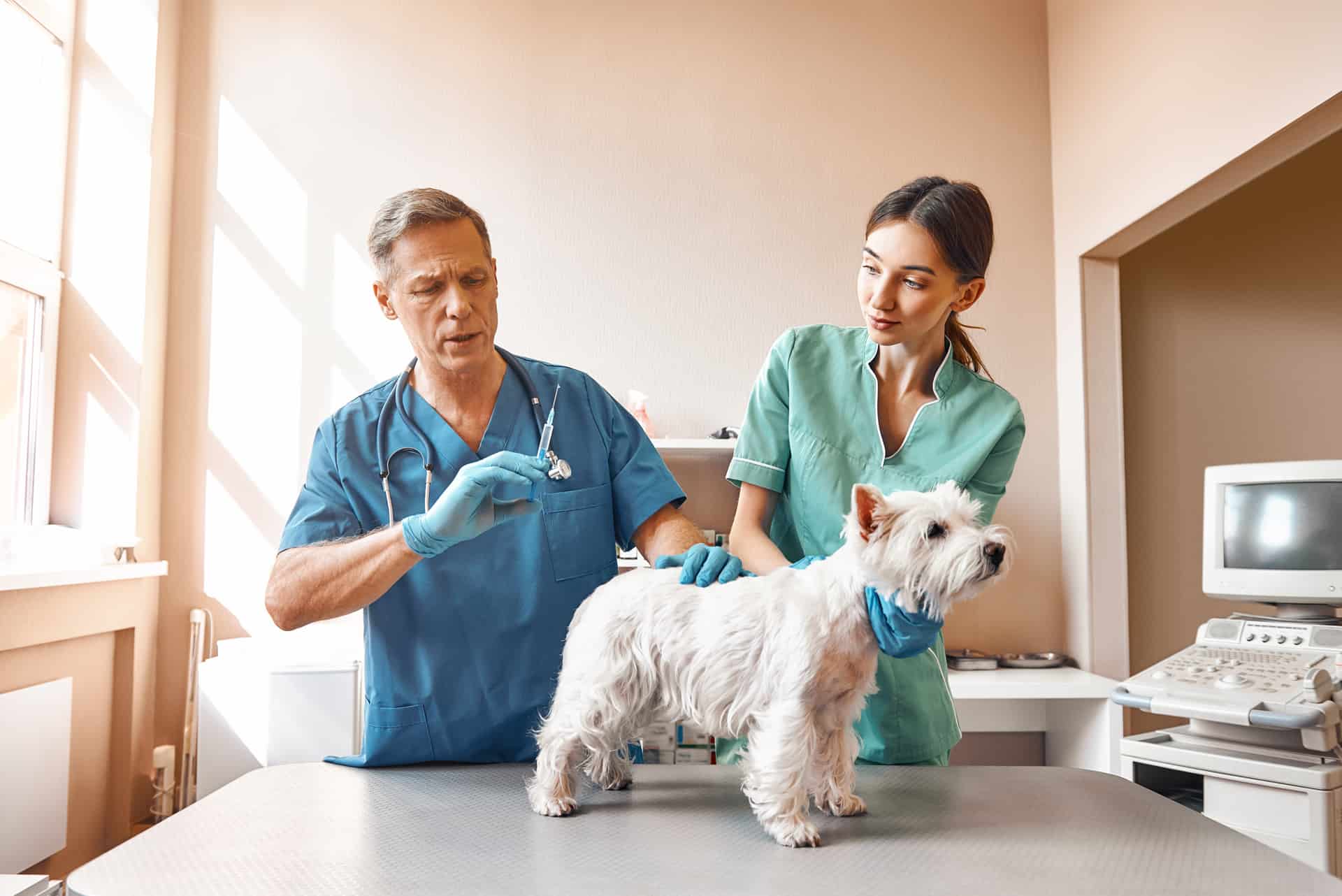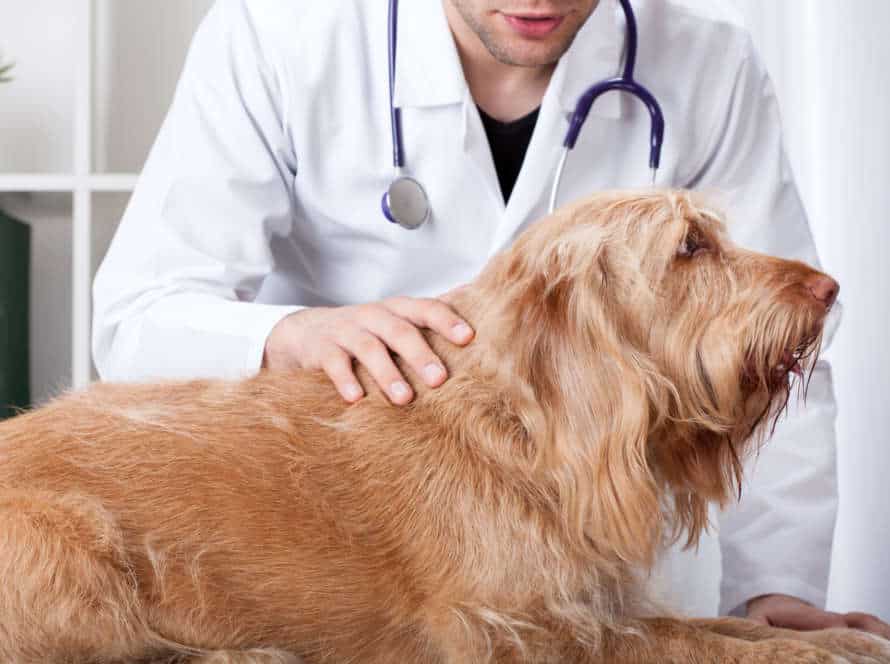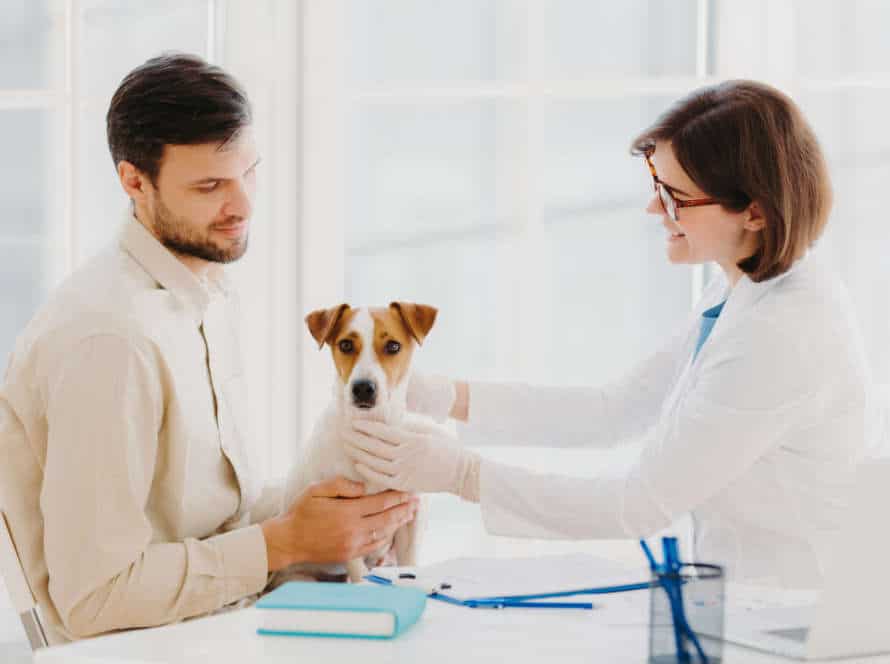Why Vaccinations are Essential for Dogs
Vaccinations are a must-have for proper pet health. They guard dogs from many illnesses, some of which can be serious. Also, vaccinations can help maintain a well-behaved pup. This is because getting regular shots can lower the risk of your pet catching a virus that leads to aggression or other behavioral problems.
In this section, we’ll explain why vaccinations are so important for dogs and how regular vaccinations can keep your dog healthy and happy.
Protecting your dog from severe illnesses
Vaccines are vital for protecting pups from severe illnesses. They work by encouraging the immune system to fight off diseases. Without vaccinations, dogs may acquire serious illnesses, like rabies, parvovirus, or distemper, which can be fatal.
Not only do vaccines protect them, but also help stop the spread of these illnesses to other dogs and people. Rabies vaccines are obligatory in some states.
Puppies should have their 1st set of shots between 6 and 8 weeks old. Then they need a booster shot every 3-4 weeks until they’re 16 weeks old. Adult dogs need regular booster shots to remain immune.
Speak to your vet about your pup’s needs and the suggested vaccination schedule for your area.
Pro tip: Keep a record of your dog’s vaccinations. Share them with the vet or groomer, to make sure they stay up-to-date.
Maintaining your dog’s health and wellbeing
Vaccinations are a must for your pup’s health and well-being. Many fatal illnesses can strike dogs and vaccinating is an easy and successful way to protect them.
Vaccines work by showing the dog’s immune system a harmless version of the disease, which gets the body ready to fight off the disease. Here are some reasons why vaccinating is so important:
- Keep them healthy: Vaccines can keep away common illnesses like distemper, parvovirus, and rabies. These illnesses can be fatal in dogs, so vaccinating is essential.
- Save cash: The cost of treating a pup with a sickness that could have been prevented by a vaccine is usually more than the cost of the vaccine itself.
- Prerequisite for Boarding kennels: A vaccination certificate has to be shown to the kennel staff before the pet can enter.
Vaccinating your pup helps them stay healthy, saves you money, and gives you an excuse to avoid boarding kennels.
Ensuring a comfortable life for you and your dog
Vaccinations are key for a pup’s well-being. They guard against numerous hazardous illnesses which can be life-threatening. Here’s why vaccinating is so important:
- Disease prevention: Vaccines protect dogs from illnesses that can cause pain, distress, and even death.
- Cost-effective: Vaccinations are an economical way to avoid costly vet visits.
- Public health: Vaccines can prevent diseases that can be passed on from dogs to humans.
- Legal requirements: Certain diseases, such as rabies, are required to be vaccinated against in many cities and states.
By making sure your doggy’s vaccinations are up to date, you can ensure they have a joyful, healthy, and well-behaved life.
Core Vaccinations for Dogs
Vaccinating your fur baby is essential for their wellbeing. Core vaccines guard against diseases which can be fatal. Depending on the country, core vaccines may vary. Commonly recommended vaccines for pups include rabies, distemper and parvovirus. Let us now delve into the specifics of these core dog vaccinations.
Distemper Vaccine
The distemper vaccine is essential for dogs’ core vaccinations. It guards against the contagious and maybe fatal virus. Distemper is a viral infection. It affects the respiratory, gastrointestinal, and nervous systems. Symptoms range from mild to severe. Examples are coughing, fever, eye and nose discharge, and seizures.
The distemper vaccine is often given as part of a combination vaccine. This includes protection against other illnesses like parvovirus and adenovirus.
Puppies should get a series of vaccinations. This begins at 6-8 weeks and continues every 3-4 weeks until 16 weeks old.
Adult dogs should have regular booster shots to maintain immunity against these diseases.
Vaccinations are important for responsible pet ownership. They help stop the spread of infectious diseases. Speak to your vet about your pet’s vaccination schedule.
Parvovirus Vaccine
Parvovirus vaccine is essential for dogs. It is a contagious and fatal virus. Vaccination is crucial to protect their health.
The parvovirus vaccine is given as a single shot or in combination. Usually, puppies get shots from 6-8 weeks old. Booster shots happen every two to four weeks until 16 weeks old.
Adult dogs should be vaccinated every three years.
Regular vaccination protects against diseases and is usually a legal requirement. Vaccination helps a dog’s wellbeing and contributes to a long life.
Canine Hepatitis Vaccine
Canine hepatitis vaccine is a must-have for dogs. Core vaccinations guard against dangerous diseases. Canine hepatitis is caused by CAV-1 virus. It spreads through body fluids. It can cause liver damage, respiratory issues and death in severe cases. Vaccination helps build immunity and reduce the risk of infection.
Other core vaccinations for dogs include rabies, distemper and parvovirus. Keeping your dog up to date on vaccinations is important for their health and behavior.
Rabies Vaccine
Rabies vaccine is a must-have for dogs. It’s a deadly virus which can affect mammals, even humans! Through saliva of an infected animal, it can be spread.
Here’s why rabies vaccination is important:
- Law demands it: Rabies vaccine is legally necessary in most states for dogs.
- Health protection: Vaccination can protect your dog from serious symptoms such as fever, paralysis and death.
- Public security: It prevents the virus from spreading to other animals and humans. Moreover, it reduces the risk of your dog getting infected if exposed.
Getting your dog vaccinated against rabies is crucial to keep them and others safe. Ask your vet for a schedule.
Non-Core Vaccinations for Dogs
Non-core vaccines for your pup are not as essential as core ones. Yet, they can still be advantageous! These vaccinations protect your doggo from sicknesses like Bordetella, Leptospirosis and Lyme. Let’s learn about the various kinds of non-core vaccines for your furry pal and the significance of them.
Bordetella/Kennel Cough Vaccine
Bordetella, also known as the kennel cough vaccine, is a non-core vaccination that’s vital for keeping your pup healthy and well-behaved. Here’s why:
- It’s highly contagious and can be transmitted through the air or direct contact with infected dogs.
- Symptoms include coughing, sneezing, fever, and nasal discharge, lasting for weeks.
- We suggest getting it for dogs that spend time in boarding facilities, dog parks, grooming salons, and other places where they come in contact with other dogs.
- By vaccinating your dog against bordetella, you not only protect him from getting sick, but also help prevent the spread of the disease to other dogs.
- Consult with your vet about which non-core vaccinations are recommended for your pooch based on his lifestyle and individual health needs.
Leptospirosis Vaccine
Leptospirosis vaccine is a highly recommended, yet non-core, vaccine for dogs in certain regions or living certain lifestyles. Leptospirosis is a bacterial infection that is shared between dogs and humans, and can be passed on through infected urine, water, or soil.
Why is it important to vaccinate your pup against leptospirosis?
- It can cause serious health issues, even leading to death, if left untreated.
- Dogs that reside in rural areas, hike, or have access to standing water are at a higher risk.
- Vaccinating your pup not only protects them, but also helps stop the spread of the disease to other animals and people.
Be sure to consult your vet and see if leptospirosis vaccine is necessary for your pup, depending on their lifestyle and environment.
Lyme Disease Vaccine
The Lyme Disease Vaccine is a non-core, but highly recommended vaccination for dogs at risk of contracting the disease.
It’s caused by bacteria transmitted through tick bites. Left untreated, it can cause serious issues such as kidney failure, joint problems, and nervous system disorders.
The vaccine is effective and safe, providing long-term protection against the disease. It’s suggested for dogs that live or travel in tick-heavy areas, or those that have had tick bites before.
As a pet owner, it’s essential to follow your vet’s recommendations for all vaccinations, including non-core ones. Regular vaccinations are essential for keeping your dog healthy and preventing deadly diseases, as well as good behavior.
Pro tip: Keep a record of all your dog’s vaccinations and booster shots to make sure they’re up-to-date.
Vaccination Schedule for Puppies
Vaccines are key for your pup’s wellbeing. They help protect against illnesses and diseases, so your pup can grow up to be a cheerful and obedient pup!
There is an advised vaccination plan for puppies. In this piece, we’ll discuss the details of the recommended vaccination plan for puppies.
Starting Vaccinations at 6 – 8 weeks
It is vital to begin vaccinating your puppies at 6-8 weeks old. This helps protect them from diseases like parvovirus, distemper, and hepatitis, which can be fatal. Follow your vet’s vaccine schedule to ensure your puppy has the best immunity. Core vaccines are: distemper, parvovirus, and canine adenovirus. Additional vaccines may be recommended based on your pup’s lifestyle and environment.
Vaccinations stop the spread of infections to other animals. Talk to your vet for a personalized vaccination plan for your puppy’s safety.
Vaccinations at 10 – 12 weeks
It’s vital to vaccinate your puppies at 10-12 weeks old for their health and safety. To protect them from potentially fatal diseases, here are 4 vaccinations to get:
- Parvovirus: Highly contagious and dangerous. Start vaccinating at 6-8 weeks in a series of 3 shots.
- Distemper: Attacks the respiratory, nervous, and digestive systems. Vaccinate at 6-8 weeks in 3 shots.
- Hepatitis: Affects the liver and other organs. Vaccinate in 2 shots, starting at 6-8 weeks.
- Rabies: Fatal to animals and humans – vaccinate at 12-16 weeks.
Don’t forget, timely vaccinations keep puppies safe and healthy!
Vaccinations at 14 – 16 weeks
Vaccines are a must for raising a healthy pooch. A vaccine schedule is essential to protect the pup from infectious diseases and stop their spread to other animals and humans. Vaccines are typically given at 14-16 weeks old, with core vaccines recommended for all doggos. These may include rabies, distemper, and parvovirus. The timing is important since puppies are so susceptible to disease at a young age.
It is important to consult with a vet to come up with a vaccination plan that fits the pup’s health, lifestyle, and risks. By following the vaccination schedule for puppies, you’re making sure your dog stays healthy and has a long, happy life.
Pro Tip: Don’t forget to set up booster shots to keep the vaccinations up to date.
Vaccination Schedule for Adult Dogs
Vaccines are key for a pup’s wellbeing and joy. All dogs should have the core vaccines throughout their adult life, usually starting as a puppy. Vaccinations also protect against common diseases, such as rabies, parvovirus, and distemper. In this article, we’ll discuss the vaccine schedule for adult dogs.
Annual booster shots
Annual booster shots are crucial for protecting adult dogs from life-threatening diseases. Core vaccines include rabies, distemper, hepatitis, and parvo. These diseases can still be deadly if contracted.
Rabies is a serious viral disease that can spread to humans and other animals through bites. Vaccinating your dog stops the spread of these diseases to other animals and people.
It’s essential to keep up with vaccination schedules, as booster shots are necessary for immunity. Vaccines prevent illness, but also help ensure your dog is healthy, happy, and well-behaved. Aggression and anxiety can arise when a dog becomes ill or in pain. As a responsible pet owner, it is important to stay on top of your dog’s vaccination schedule to protect their health and well-being.
Titers test to check immunity levels
A Titers test is a blood test to measure the immunity levels of dogs who have been vaccinated. It shows the concentration of antibodies in the dog’s blood. It helps pet owners make wise decisions about their dog’s vaccinations.
Vaccinations are important for a dog’s health, but too many can put a strain on the immune system. A Titers test can make sure your dog is safe from illness without being over-vaccinated.
Common vaccinations for adult dogs might include rabies, distemper, parvovirus, and hepatitis. But, vaccination schedules can vary based on age, breed, lifestyle, and overall health. Talking with your vet and regular check-ups can help decide the best vaccinations for your pup. This will keep them healthy and well-behaved.
Other vaccination factors to consider
It is important to remember when your dog has been vaccinated and when they need their next one. Vaccinations do not last forever and can weaken over time. Also, consider if your pup’s lifestyle requires additional vaccinations. For example, if they come into contact with other dogs often or spend time outdoors in areas where diseases can spread easily. Lastly, watch for any side effects after the vaccination. Mild ones could be lethargy, lack of appetite, or fever. More severe signs, such as vomiting, diarrhea, or difficulty breathing, should be seen by a vet. Taking these factors into consideration will help your adult dog live a healthy, happy life.
Conclusion
To sum up, vaccinations for your pup are a must! Not only for their wellbeing, but also to protect you and those around them. Rabies and parvo are deadly, so vaccinating helps stop the spread of these illnesses to humans. Plus, lots of groomers and doggy daycares need proof of these shots before accepting your pet.
Vaccinations are an easy and efficient way to keep your pup healthy and content. So, arrange regular check-ups with the vet to make sure your pup is getting the vaccinations they need on time. A fit, healthy dog is a well-behaved one, and deserves all the love you can provide.
Frequently Asked Questions
1. Why are vaccinations important for my dog’s health?
Vaccinations play a crucial role in protecting your dog from infectious diseases like rabies, parvo, distemper, and more. These diseases can be potentially fatal and vaccinations are the best way to prevent them.
2. Are all vaccinations created equal?
No, not all vaccinations are created equal. Some are core vaccinations that are mandatory for all dogs, while others are non-core vaccinations that are recommended based on your dog’s lifestyle and environment. Your veterinarian can help you determine which vaccinations are best for your dog.
3. How often does my dog need to be vaccinated?
The frequency of vaccinations depends on your dog’s age, health status, and lifestyle. Puppies require more frequent vaccinations than adult dogs, and booster shots may be necessary to maintain immunity. Your veterinarian can help you develop a vaccination schedule that is tailored to your dog’s needs.
4. Are vaccinations safe for my dog?
Yes, vaccinations are generally safe for dogs. Side effects are rare and usually mild, such as soreness at the injection site or lethargy. Serious reactions are extremely rare and usually occur within a few minutes to a few hours after vaccination.
5. Can my dog still get sick even if they are vaccinated?
While vaccinations greatly reduce the risk of your dog contracting a disease, they are not 100% effective. In some cases, your dog may still get sick even if they are vaccinated. However, the severity of the illness will likely be much less than if they were unvaccinated.
6. What happens if I don’t vaccinate my dog?
If you don’t vaccinate your dog, they will be at risk of contracting serious and potentially life-threatening diseases. Additionally, some vaccines are required by law, so failure to vaccinate could result in legal consequences. It’s important to protect your dog’s health by staying up-to-date on vaccinations.







